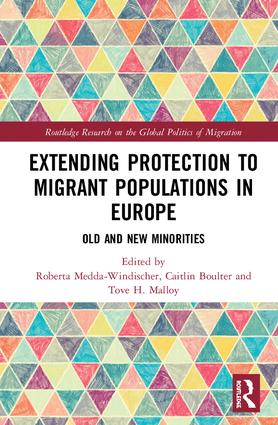Extending Protection to Migrant Populations in Europe - Old and New Minorities
Caitlin BOULTER, Malloy TOVE H., Roberta MEDDA-WINDISCHER
Availability: Out of stock - available in 15 open days
- Categories: Asylum and Immigration
- Publisher: ROUTLEDGE
- ISBN: 9781138590724
- Binding: Paperback
- Number of pages: 182
Summary
This comprehensive and innovative volume focuses on the usefulness and relevance of extending the scope of protections already in place for national minorities ('old minorities') to migrant populations ('new minorities') in Europe.
Delving into a highly relevant but under-researched issue, the book examines the feasibility of expanding the system of protection for national minorities to migrant groups, as well as considering issues of diversity, security, socio-economic concerns and identity. Taking a multidisciplinary perspective, and combining insights from political science, law, sociology and anthropology, it asks the central question of how far the extension of policies and rights currently specific to national minorities is conceptually meaningful and beneficial to the integration of ‘new’ minorities. In doing so, it questions the feasibility and appropriateness of extending the scope of the protections already in place for national minorities to other categories of population.
This book will be of key interest to scholars, students and practitioners of European Union politics, migration studies, minority studies and more broadly of sociology, international law and human rights.
Table of contents
This comprehensive and innovative volume focuses on the usefulness and relevance of extending the scope of protections already in place for national minorities ('old minorities') to migrant populations ('new minorities') in Europe.
Delving into a highly relevant but under-researched issue, the book examines the feasibility of expanding the system of protection for national minorities to migrant groups, as well as considering issues of diversity, security, socio-economic concerns and identity. Taking a multidisciplinary perspective, and combining insights from political science, law, sociology and anthropology, it asks the central question of how far the extension of policies and rights currently specific to national minorities is conceptually meaningful and beneficial to the integration of ‘new’ minorities. In doing so, it questions the feasibility and appropriateness of extending the scope of the protections already in place for national minorities to other categories of population.
This book will be of key interest to scholars, students and practitioners of European Union politics, migration studies, minority studies and more broadly of sociology, international law and human rights.
